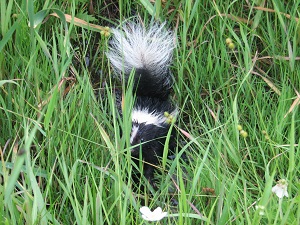
BURLINGTON – State health and wildlife officials have one message for people who come across any animals in the wild – “Just leave them be.”
The State’s head game warden, Col. Jason Batchelder, says spring is the time of year when wardens get calls from people who find little animals they believe are abandoned or orphaned, and take the animals home to care for them. Batchelder says that’s bad for the animals, and potentially for people too. “It’s perfectly normal for young wildlife to be on their own, especially newborn fawns.” said Batchelder. “Young and small animals can be irresistibly cute, but their best chance of survival is to remain in the wild. If you have concerns about an animal, contact the local game warden.”
Natalie Kwit, DVM, is Vermont’s public health veterinarian. “It’s easy to think an animal in the wild may need rescuing, especially a baby animal. Even though they can be cute, wild animals are not pets, and can pose serious health risks to people who touch them,” said Dr. Kwit. “When someone is bitten by a wild animal or even just exposed to its saliva, that animal will need to be tested for rabies, which requires killing it.”
Rabies is a fatal disease for both humans and animals. Rabies infects mammals and is most common among wild animals like raccoons, skunks, foxes and bats. Cats, dogs and livestock can also get rabies if they have not been vaccinated. Health officials report that 40 animals tested positive for rabies in Vermont in 2017, and 11 have tested positive so far this year. Nearly every year in Vermont, people bring wildlife into their homes that later test positive for rabies.
Animals with rabies often show a change in their normal behavior, but you cannot tell whether an animal has rabies simply by looking at it. The best way to protect yourself, your loved ones and Vermont’s wildlife is to just steer clear.
“Since you can’t tell if an animal has rabies just by looking at it, people should not approach any wild animal,” said Col. Batchelder. “If you notice an animal acting strangely and are concerned it may be rabid, contact a game warden or local law enforcement immediately, and do not attempt to handle it yourself. Our wardens are specially trained to deal with potential rabies cases. Handling a wild animal could put you and your family at risk of a potentially deadly disease,” Batchelder explained. “The best thing for wild animals is to enjoy them from a distance.”
If you suspect an animal may have rabies:
Call the Rabies Hotline 1-800-472-2437 (1-800-4-RABIES).
For more information about rabies in Vermont, visit healthvermont.gov/rabies
If you find an animal that appears orphaned, injured or abandoned, learn what you can do at vtfishandwildlife.com/livingwithwildlife.
